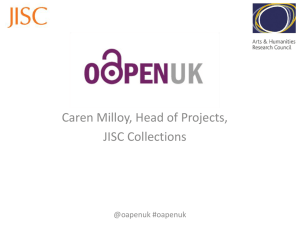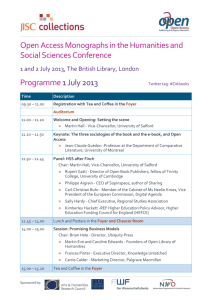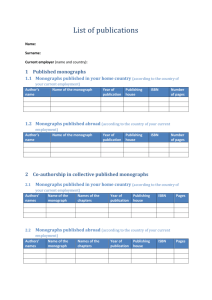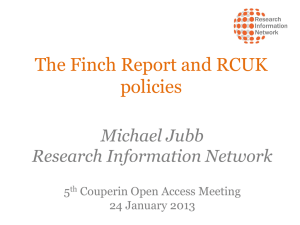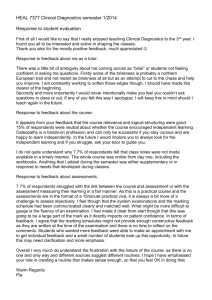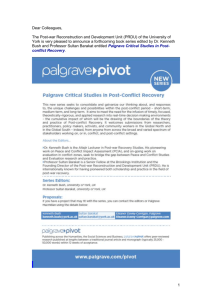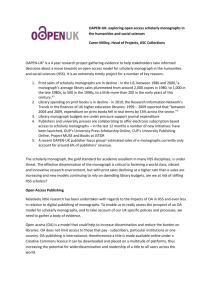See librarian survey here.
advertisement
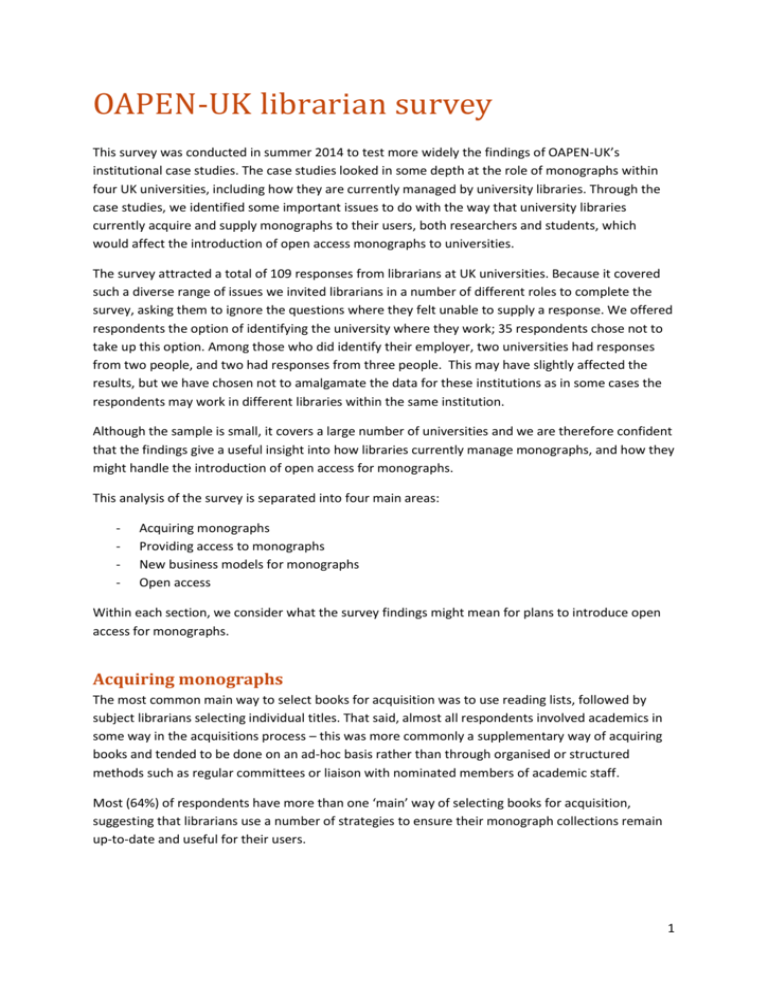
OAPEN-UK librarian survey This survey was conducted in summer 2014 to test more widely the findings of OAPEN-UK’s institutional case studies. The case studies looked in some depth at the role of monographs within four UK universities, including how they are currently managed by university libraries. Through the case studies, we identified some important issues to do with the way that university libraries currently acquire and supply monographs to their users, both researchers and students, which would affect the introduction of open access monographs to universities. The survey attracted a total of 109 responses from librarians at UK universities. Because it covered such a diverse range of issues we invited librarians in a number of different roles to complete the survey, asking them to ignore the questions where they felt unable to supply a response. We offered respondents the option of identifying the university where they work; 35 respondents chose not to take up this option. Among those who did identify their employer, two universities had responses from two people, and two had responses from three people. This may have slightly affected the results, but we have chosen not to amalgamate the data for these institutions as in some cases the respondents may work in different libraries within the same institution. Although the sample is small, it covers a large number of universities and we are therefore confident that the findings give a useful insight into how libraries currently manage monographs, and how they might handle the introduction of open access for monographs. This analysis of the survey is separated into four main areas: - Acquiring monographs Providing access to monographs New business models for monographs Open access Within each section, we consider what the survey findings might mean for plans to introduce open access for monographs. Acquiring monographs The most common main way to select books for acquisition was to use reading lists, followed by subject librarians selecting individual titles. That said, almost all respondents involved academics in some way in the acquisitions process – this was more commonly a supplementary way of acquiring books and tended to be done on an ad-hoc basis rather than through organised or structured methods such as regular committees or liaison with nominated members of academic staff. Most (64%) of respondents have more than one ‘main’ way of selecting books for acquisition, suggesting that librarians use a number of strategies to ensure their monograph collections remain up-to-date and useful for their users. 1 Figure 1: Methods of monograph acquisition 80 74 71 70 58 58 60 55 Percentage 50 40 49 40 39 36 37 30 29 27 25 21 21 20 13 13 10 12 14 7 2 0 Subject Librarians Academics Academics Patron-driven librarians select select e-book recommend request titles acquisition individual titles packages from individual titles on ad-hoc basis vendors in a structured way Reading lists Student requests Method of selecting monographs Main way of selecting monographs Supplementary way of selecting monographs Rarely/never select monographs in this way Most respondents used a library vendor as a main way of acquiring print content – only 5% did not. Among those who used a library vendor, the majority (56%) used just one as a main way of acquiring books. The picture was broadly similar for e-books: 7% did not use a library vendor as a main way of acquiring books, while 46% used a single vendor as a main way of acquiring books. In general, librarians seemed to work with more vendors as main or supplementary suppliers of e-books than they did of print books. 2 Figure 2: Number of library vendors worked with 40 34 35 Percentage 30 27 26 28 25 19 20 18 Print 15 11 10 7 4 3 5 Electronic 12 8 2 0 0 0 1 2 3 4 5 6 Number of library vendors worked with Respondents were roughly evenly divided between preferring to buy books in electronic format, preferring to buy them in both print and electronic, and not having a policy on print versus electronic. Only 9% of respondents preferred to buy in print. 10% of respondents said that they would rarely or never buy a book they already held in an alternative format if requested to do so by an academic, and a similar number said that they would always buy a book in an alternative format if requested to do so by an academic. The remainder were happy to do so, as long as money was available in the budget or the academic was able to demonstrate that they needed it in that specific format. When asked to agree with various statements about the monograph collection at their institution, the one which elicited the strongest agreement was ‘the first priority for our book budget is to ensure we have the right material for students’. This aligns with the importance placed upon reading lists as a way of selecting content. Many respondents also agreed that ‘our library has a strong monograph collection in the areas where our staff are active in research’. But most respondents disagreed with the statement that ‘our budget for textbooks is separate from our budget for monographs and other book-based materials’, and respondents were roughly equally split on whether they had enough money to buy all the monographs they needed each year. This suggests that in many libraries student needs take priority, and it may be the case that these sometimes come into conflict with what researchers want or need. 3 Figure 3: Book budgets and collections 100 87 90 83 80 Percentage 70 61 60 50 46 42 40 30 30 20 12 9 10 7 7 11 7 0 We usually have Our library has a strong The first priority for our Our budget for enough money to buy monograph collection book budget is to textbooks is separate all the monographs we in the areas where our ensure we have the from our budget for need each year staff are active in right materials for monographs and other research students book-based materials Statement Strongly agree / agree Neutral Strongly disagree / disagree Acquiring monographs – how does this relate to open access? Student needs seem particularly important when deciding which books to buy – something which is strongly supported by our findings from the case studies. It suggests that librarians are most likely to engage with open access books if they are required by students, meaning that publishers of open access monographs may want to highlight their usefulness for teaching and learning as well as research. Library vendors are clearly important resources for both print and e-books, and most respondents use these for their acquisitions. Publishers of open access monographs need to ensure that their titles are fully integrated into such systems, particularly if their business models rely upon selling alternative versions of the book (such as print books or formatted e-books). Most respondents are happy at least to consider buying books they already hold in an alternative format, if the academic requests it. Again, this is encouraging for business models which might rely upon sales of alternative formats for their main income stream. However, the increasing pressure on book budgets, indicated in the large number of respondents who felt they did not have enough money to buy all the books they need, suggests that this may not be the most sustainable revenue stream. Providing access to monographs Most respondents said that usage restrictions applied to at least some of their e-books. The most common kind of restriction was only permitting a certain number of users to view the book simultaneously. Only 2 respondents said that none of their e-books were subject to any usage restrictions. 4 Figure 4: Usage restrictions on e-books in libraries 70 62 60 56 51 51 Percentage 50 40 31 27 30 20 25 18 24 21 23 11 Most of our e-books Some of our e-books Few/none of our e-books 10 0 Limited download periods Limited number Limited number No download to of users of accesses local devices accessing before further simultaneously payment Restriction type Librarians currently make the monographs that they hold discoverable to end users on a range of platforms: the library catalogue is the most common, followed by a web-scale discovery system such as Summon, Primo or WorldCat. Very few currently use an institutional repository for discoverability, and around a third use Google or Google Scholar to indicate the books that are available to researchers. We asked respondents where they would expect researchers to find open access books. The results were broadly similar, although note the fifth of respondents who would not put open access books in their library catalogue, though they do currently use it for non-open access books. Respondents anticipate much higher use of institutional repositories (both their own and those of other institutions) and of Google or Google Scholar for open access books than for books that are not open access. 5 Figure 5: Discovery locations for open access and non-open access books 80 70 69 58 Percentage 60 50 41 44 37 40 Only non-OA 26 30 22 20 10 OA and non-OA 33 Only OA 20 Neither OA nor non-OA 14 13 12 6 4 1 0 0 Web-scale discovery system Library catalogue Institutional repository Google/Google Scholar Resource 30% of respondents currently identify open access monographs for inclusion within their library collections – 49% do not, while 21% were unsure. Almost half of respondents knew that their institutional repository contained some combination of monographs and book chapters, and a relatively large number of respondents were unsure – only 14% were certain that their repository did not contain monographs or book chapters. Figure 6: Book content currently held in institutional repositories 40 38 35 Percentage 30 25 20 25 19 14 15 10 4 5 0 I don't know Book chapters Monographs and book chapters No Monographs Type of output 6 Respondents were overwhelmingly positive about hosting open access monographs within their own institutional repository, with nobody ruling it out completely. Most expressed a preference for hosting only content which has an association with their own institution, rather than content produced elsewhere but which might be valuable to their own users. Figure 7: Book content that may be held in institutional repositories in future 100% 90% 80% 15 18 11 I don't know 19 Percentage 70% 60% 50% 52 40% 30% 67 20% 10% 18 Yes, anything we want our researchers/ students to be able to read Yes, if edited by current/former member of staff Yes, if produced by current/former member of staff 0% Monographs Book chapters Type of output We asked respondents to agree or disagree with a number of statements relating to long-term access to monographs and Green open access for monographs. The results show that, for the most part, librarians are concerned about long-term access to e-books, and many are unconvinced that publishers are going to be able to supply this in the long-term. When it comes to OA monographs, most are happy for their institutional repository to be the long-term source of work produced at their institution, but slightly fewer would be happy to rely on other institutions to provide the same service for their own research outputs. In this context, it is not surprising that a centralised repository was a popular suggestion, although it would not necessarily replace storage in the institutional repository. Respondents also agreed that a central repository should play a role in standards for metadata and licensing for open access books. 7 Figure 8: Long-term availability of open access and non-open access monographs 100% 90% 2 12 2 8 28 80% 16 3 22 22 26 70% Percentage 16 2 8 60% 50% 40% 86 48 82 70 30% 89 74 59 20% 10% 24 0% Ensuring long-term I have confidence in I would be happy for I would be happy to I would support the A central repository A central repository access to electronic the arrangements that the institutional rely upon other development of a should ensure would not replace books that we acquire publishers have made repository to be the instiutions' central repository for standardised storage of open access is a major priority for for long-term access main long-term source repositories for long- open access books, to metadata and books produced by my library to the electronic of open access term access to open provide long-term licensing information our researchers in our books in my library versions of access versions of access to open access for open access books institutional collection monographs produced monographs produced versions of repository by researchers at my by their researchers monographs and institution ensure these are available within library discovery systems Statement Strongly agree/agree Neutral Disagree/strongly disagree 8 Providing access to monographs – what does this mean for open access? Usage restrictions apply to a large number of e-books currently held by academic libraries. Open access could help to resolve these problems by making books available under more liberal licences, but only if the third-party vendors which supply these e-books to libraries via platforms for endusers are able to accommodate such liberal licences. Evidence from other OAPEN-UK work packages suggests that this may be a challenge. Respondents made some distinctions between open access and non-open-access monographs in terms of where they would make them discoverable. Most striking is the 22% of respondents who would not make open access monographs available through the library catalogue: it may be important to understand more about why they would take this decision, as it would not necessarily be helpful to make a distinction between open and non-open content for researchers undertaking discovery. Similarly, it would be helpful to know why the 37% of respondents who would only make open content available via Google would make this choice – is it a technical issue, or a library policy decision? The survey suggests that many librarians are already engaging with Green open access for monographs or book chapters, although findings from the institutional case studies indicate that this is not necessarily something that is done routinely. Overall, there was great positivity about the idea of hosting OA books in institutional repositories, and a reasonable level of confidence in long-term availability of books via this route. That said, most respondents also supported a central repository operating in tandem with their own institutional repositories, and felt that it could add value by working to standardise metadata and licence conditions for OA books. This may be particularly important since institutions are, for the most part, only keen to host content that has some connection to their university rather than content that may be useful to their researchers. Without some kind of centralised discovery facility for institutional repositories, this may not be particularly helpful to the end user. New business models for monographs Respondents showed a high level of awareness of open access business models for monographs. The most widely-known model was the library consortium, and over two-fifths of our respondents were actively participating in one of these models (probably Open Library of the Humanities, Knowledge Unlatched, or both). In terms of other business models, the most common response was awareness but not familiarity, suggesting that some work still remains in ensuring librarians understand what the options are for open access monograph publishing. 9 Figure 9: Familiarity with new open access publishing models 100% 5 5 36 37 90% 80% 43 70% Percentage 60% 50% 19 40% 30% 20% 10% My institution actively participates in this model I'm familiar with this model 39 47 25 13 19 0% Library-funded consortuim based models New open access presses I'm aware of this model but not familiar with it I've never heard of this model 11 Open access from commercial publishers OA model New business models – what does this mean for open access? Most respondents had some level of awareness of new business models, which is encouraging for those who would like to see more widespread adoption of open access for monographs. But institutions don’t yet seem to be actively participating in models other than library-based consortium funding. This may be, at least in part, because we did not define what we meant by ‘participating’ – respondents may be buying or ingesting OA books published by new or established presses, but may have thought that ,participating, means supporting publication with those presses by researchers employed at the institution. Attitudes towards open access Respondents were overwhelmingly positive about the principle of open access, although only 32% considered themselves ‘very positive’ about open access for monographs, compared with 54% who considered themselves ‘very positive’ about open access for journals. 10 Figure 10: Attitudes towards the principle of open access 120 Percentage 100 1 2 3 5 11 80 Don't know 60 Negative/ very negative 96 40 Neutral 80 Very positive/ positive 20 0 Journals Monographs Type of output Respondents were less confident about the ease of implementing open access. For both journals and monographs, Green open access was seen as the less difficult option, although in neither case did large numbers of respondents consider it easy or very easy. Gold open access for journals was seen as difficult or very difficult by just over half of respondents, and Gold open access for monographs was seen as difficult or very difficult by 71% of respondents, a large majority. Figure 11: Beliefs about ease of implementing open access Percentage 120 100 5 80 32 60 40 8 11 55 54 9 71 40 20 23 0 Green journals 26 24 11 10 Gold journals Green monographs 17 3 Gold monographs Type of output Very easy/ easy Neither easy nor difficult Difficult / very difficult Don't know 11 Attitudes towards open access – what does this mean? Respondents’ positivity about the principle of open access for both books and journals is encouraging. But it is worth noting that fewer of them were ‘very positive’ about open access for monographs than for journals. This may mean that there is less appetite within libraries to engage with open access for books, compared to their enthusiasm in relation to journals – or it may simply mean that advocates of open access for monographs need to do a better job of explaining why it is a good idea. When it comes to the practicality of implementing open access, there is a strong sense that journals will be easier than books, and that Green is easier than Gold for both books and journals. Anybody seeking to promote open access for monographs will need to engage with librarian concerns on this issue. 12
